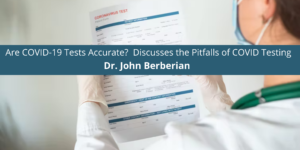Are COVID-19 Tests Accurate? Dr. John Berberian Discusses the Pitfalls of COVID Testing


Before vaccines for COVID-19 were readily available, testing was our most important line of defense for combating the virus’s spread. Even now that safe and effective vaccines are easily accessible, COVID-19 testing remains an essential practice. But how accurate are these tests, and can we rely on their results completely when it comes to determining whether or not a person is at risk of spreading the virus? According to COVID-19 testing expert John Berberian, there is some reason for concern when we examine the accuracy of our current testing procedures.
Detecting COVID-19 Variants
We have already seen multiple mutations of the SARS-CoV-2 virus responsible for causing COVID-19, including the especially contagious Delta variant. These mutations create a number of concerns for healthcare professionals, including the potential for the virus to continue mutating into deadlier and more contagious forms as well as the fact that continued mutation of the virus makes it difficult for a single vaccine to provide long-term immunity. John Berberian points out, though, that another area of concern regarding COVID-19 variants is that they don’t always show up on our tests.
In March 2021, the FDA published a report “alerting clinical laboratory staff and health care providers that false negative results may occur with any molecular test for the detection of SARS-CoV-2 if a mutation occurs in the part of the virus’ genome assessed by that test”.
When it comes to COVID-19 testing, nothing is more concerning than a false negative. Those who are asymptomatic or experiencing mild symptoms will take a false negative result as a clean bill of health, causing them to forgo the precautions that might otherwise prevent them from spreading the virus to others. While current COVID-19 tests are not entirely incapable of detecting variants of the virus, the FDA’s report shows that the potential for false negatives due to variants of the virus is a real and present danger.
The Importance of Using the Right Swab
Standard oropharyngeal swabs are perfectly capable of detecting most respiratory infections with a high degree of accuracy. According to John Berberian, though, COVID-19 is different. The problem with using oropharyngeal swabs for COVID-19 testing is the fact that the SARS-CoV-2 virus is capable of burying itself deep within a patient’s nasal cavities – in some cases, deeper than oropharyngeal swabs are capable of reaching. If the swab used to gather the sample that will be tested for the virus isn’t actually able to reach the areas of the nasal cavities where the virus is present, there is once again the potential for false negative results.
The good news, though, is that there is a readily available solution to this problem. John Berberian says that NPS swabs such as the NPSFlex™ swab are much better suited for COVID-19 testing than traditional oropharyngeal swabs thanks to their ability to reach deeper inside of a patient’s nasal cavities. For this one simple reason, John Berberian argues that NPS swabs should have already become the standard for COVID-19 testing. In many instances, though, this isn’t the case.
Oropharyngeal swabs are not entirely incapable of detecting the SARS-CoV-2 virus, but they are inaccurate enough to create cause for concern. The ability of NPS swabs to more easily reach the areas where the virus likes to hide combined with characteristics such as their non-abrasive design and ample lubrication that make them more comfortable for patients despite their deeper penetration leaves healthcare providers with no real reason not to choose NPS swabs over their oropharyngeal swab counterparts. According to John Berberian, this single fix could solve a lot of our current problems with COVID-19 testing.
The Future of COVID-19 Testing
For as long as COVID-19 continues to spread throughout the population, COVID-19 testing will remain a vital healthcare service. Solving the issues that can lead to false negative results, therefore, is something that needs to be made a priority moving forward. Adopting NPS swabs as the standard for COVID-19 testing along with continued efforts to overcome the testing pitfalls created by variants of the virus will go a long way toward ensuring that COVID-19 testing actually delivers on the peace of mind that it promises.
